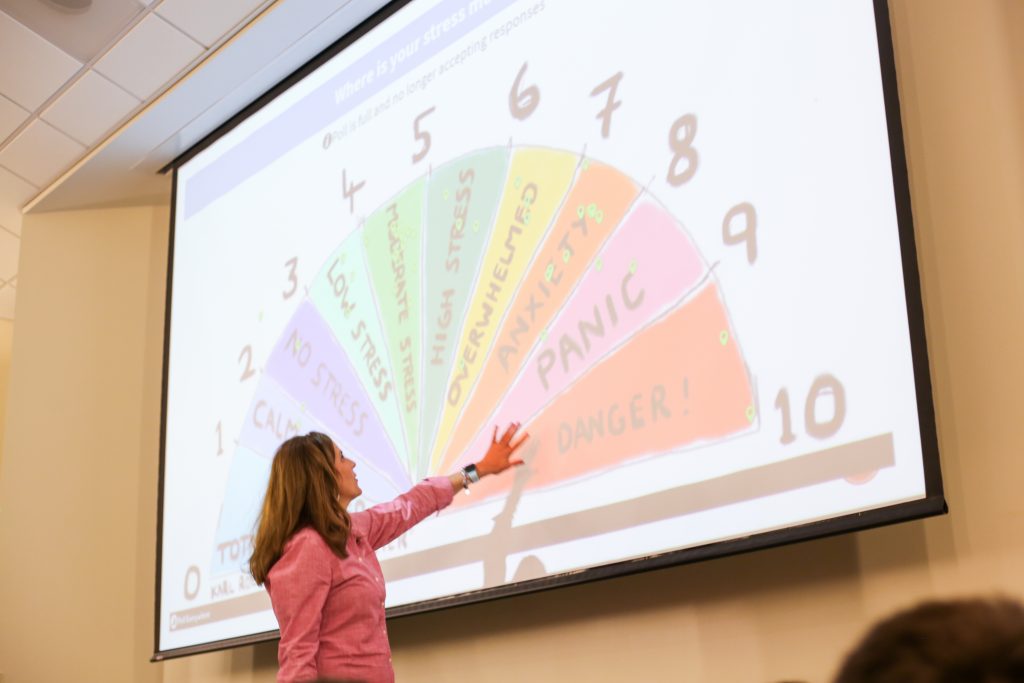
While most people may think of stress as a bad thing, Jennifer Wegmann, lecturer of health and wellness studies at Binghamton University, focused on the benefits of stress during her talk on Thursday.
More than 150 students gathered to listen to Wegmann’s lecture and learn how to stop stressing about being stressed. The lecture was part of the BU First Year Experience (FYE) program, and Wegmann’s presentation discussed her research on what it means to be stressed and how students can use the stress in their daily lives to help them be more productive and healthy.
Each fall, FYE offers first-year students the chance to take UNIV 101, a two-credit course that aims to have students explore and discuss academic topics, utilize campus resources, develop critical thinking and writing skills and improve their time management. The program also offers a lecture series. Christian Howles, a graduate assistant for FYE and a first-year graduate student studying student affairs administration, said the program is a good opportunity for students to find connections on campus.
“The purpose of the FYE Lecture Series is to connect students with faculty through what they’re doing or what they have researched in various areas,” Howles said. “There are different focuses every semester, and each lecture is a different topic.”
As one of six lecturers this semester, Wegmann wanted to emphasize the importance of attitude, specifically toward the stressors in students’ lives.
“My latest research shows that there’s a direct correlation between mindset and well-being,” Wegmann said. “The more enhancing stress mindset is, the higher student well-being is. If we can change the way we think about stress, it’s going to change the way we appraise stress, cope with it and we’ll have better and more positive outcomes.”
Wegmann’s lecture included stories of positive motivation and the power of optimism, as well as the importance of self-care. According to Wegmann, students are less likely to feel as negatively affected by the stressors in their lives by keeping their bodies healthy and having a positive attitude. She employs these methods in her stress management class.
“[It] focuses on the benefits of stress and our physical activity and wellness,” Wegmann said. “We found that over the course of a semester, we had the capability to change students’ minds about stress.”
For students experiencing particularly high levels of stress, Doug Wehbe, Student Association vice president for academic affairs and a senior majoring in computer science, recommended they seek out campus resources such as the High Hopes Helpline and the University Counseling Center. Students can also attend stress-relieving events organized by resident assistants in on-campus residential communities, such as therapy dog nights or craft activities.
However, while using healthy stress management techniques and looking for help is important, Wegmann also advised students to remember stress can be a good thing and a force that drives people to be better and more productive.
“Whatever your stressors are, how you appraise them and how you cope with them is going to influence your outcomes,” Wegmann said. “We have a psychological and a physiological response to the stressors in our lives. We oftentimes see this as negative. I want to tell a different story about stress — the fact that stress can make you better and more productive, it can make you healthier and give you better focus.”
According to Wegmann, people stress about the things in their lives that hold value to them — such as students stressing about school and grades.
“If you didn’t care, you wouldn’t be stressed,” Wegmann said. “Everyone has a choice about all the stressors in their life — you can choose to use them to your advantage. You can choose to be better because of your stress, or you can let it destroy you. The most important thing to understand is that you get to choose.”
Tatum Murphy, an undeclared freshman, attended the lecture as a requirement for the UNIV 101 course, but said the talk changed his outlook on stress.
“We have to come to two of the FYE lecture series for the class, but [Wegmann’s] seemed the most relevant to me,” Murphy said. “Now I’m going to try to keep things more positive. Instead of just thinking, ‘Oh, I’m so stressed,’ I’ll try to be more positive about it, and try doing [physical activities] like yoga.”


